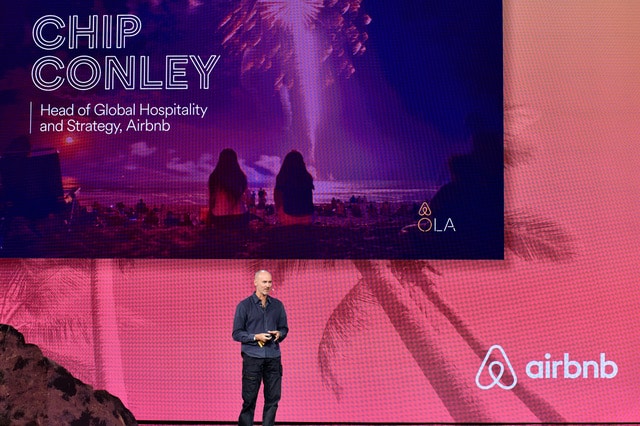Chip Conley of Airbnb: The advice I wish I’d been given at 10, 20, 30, 40, and 50
This summer, I spent a week in Mexico with my two young sons who, on occasion, want to tap into my wisdom. While there, I received an email from a new friend, a generation younger than me, who asked this 57-year-old to give him the kind of advice I wish I’d heard as a 42-year-old. Knowing my advice might be valuable gave me a renewed sense of purpose. But, unfortunately, many of us in our fifties or older feel increasingly invisible as if we don’t have much to offer the world.
When I surveyed nearly 200 middle-aged people about their life and career in preparation for writing my new book, Wisdom@Work: The Making of a Modern Elder, my number one surprise was how often the word “irrelevant” came up in conversations. One person described feeling like an old carton of milk, with an expiration date stamped on their wrinkled forehead. Others felt obsolescent, like an old rusting machine. One paradox of our time is that we enjoy better health than ever later into life, remain vibrant, and stay in the workplace longer.
But we feel less and less relevant.
Here’s an exercise you might consider as a means of harvesting and appreciating your wisdom. What advice would you give to a 10-year-old who was mature enough to take it? Or to yourself if you could time-travel back to when you were 10? Now, move to a 20-year-old and offer a couple pieces of sage advice. Keep going until you reach your current age.
I spent less than an hour reflecting and writing what I’ve offered below, so don’t be frightened by the time commitment. And, imagine if you kept a “Wisdom Book” by your bedside table and added a few meaningful observations each week.
My advice to a 10-year-old
1. Learn what will serve you later, especially those subjects or skills that are much harder to pick up later in life: a foreign language or three, surfing or skiing, guitar or drawing.
You’re less likely to be critical of yourself at this age (depending upon your parents) and you can operate with a growth mindset (always trying to improve yourself) as opposed to a fixed mindset (always trying to prove yourself). A growth mindset will serve you well in your life. Know that regret for what you didn’t do is twice as painful as regret for something you did which didn’t turn out well. Nothing ventured, nothing gained.
2. Experience what it means to be “the other.” The world is full of “others” and it’s when we’re young that we learn the empathy to know what it feels like to be the other.
Encourage your parents, if they can afford it, to take you to as many countries as possible. If travel is not possible, then hit the library to explore books and movies that can take you to another place to learn about other cultures. Consider being a foreign-exchange student when you get to high school. In an increasingly diverse world that needs oodles more empathy, you’ll be on an accelerated path to becoming a full-fledged healthy adult if you learn this.
“A growth mindset will serve you well in your life. Know that regret for what you didn’t do is twice as painful as regret for something you did which didn’t turn out well.”
My advice to a 20-year-old
1. Look at how you learn best and then double-down on that means of learning, whether it be visual, aural, verbal, or physical.
We live in a world where learning and coloring outside the lines are becoming increasingly accepted, and the internet offers you so many ways to learn. Know that your best learning may come from those who care the most about you. Become open to constructive criticism without reacting.
2. Long ago, Dale Carnegie offered a little snake oil with his bestselling book, How to Win Friends and Influence People. I was forced to read it at age 19 as a budding commercial real estate salesperson and, while it felt a little inauthentic, I did learn quite a bit about human nature. Psychology may be the most important class you take in college as it’s been proven that EQ (emotional intelligence) is likely more important than IQ or experience when it comes to one’s career path.
Surround yourself with the people you want to become. My twenties were spent with a lot of artists, which was balancing for my type-A entrepreneur self. We often judge ourselves relative to those who surround us—whether that’s based upon salary, beauty, or sense of perspective, or humor. Nestle yourself in a healthy neighborhood as you will be more influenced by your neighbors than you think.
My advice to a 30-year-old
1. Make sure you and your inner child go out on a date every so often. You’re a full-fledged adult now, which means you think you’re not supposed to play. The truth is, play, curiosity, and creativity may be the differentiators in your career and your happiness.
Give more attention to the “why” and “what if” questions a 4-year-old might ask because it’s in our thirties when we get a little too possessed with the “what” and “how” optimization questions of life.
2. Find a mindfulness practice that suits you—meditation, prayer, journaling, yoga—as this is the decade when your “monkey mind” goes wild with so many options to consider. Be more mindful, less monkey. And, blessedly, get more sleep—an essential of life that becomes more precious in our thirties. Presence may be your greatest present to yourself.
“The truth is, play, curiosity, and creativity may be the differentiators in your career and your happiness.”
My advice to a 40-year-old
1. The U-curve of happiness is well-established and shows that the roughest patch of one’s life is the forties, so be prepared for a bumpy ride as Disappointment = Expectations – Reality. This is the period when expectations (and the possibility that you won’t meet them) start to become acute.
2. Make sure you’ve created some “emotional insurance” via individuals or groups of people with whom you can be vulnerable and curious. This is especially important for middle-aged men, as this is a particularly treacherous decade for them and they tend not to connect with their peers as easily or in the same way women do.
My advice to a 50-year-old
1. The first half of your life is focused more on accumulating: success, responsibilities, family, friends, hobbies, identities. A mid-life crisis is often about feeling weighed-down by all of this. Focus on what’s most important in your life and start the process of editing that which doesn’t serve or nourish you.
2. Viktor Frankl wrote in his epic book Man’s Search for Meaning, “Between stimulus and response, there is a space. In that space is your power to choose your response. And, in your response lies your growth and your freedom.”
No wiser three sentences have ever been written about emotional maturity. If you haven’t mastered the difference between reaction and response by this time in your life, it’s essential you take a crash course now. Start by reading Frankl’s book.
“Focus on what’s most important in your life and start the process of editing that which doesn’t serve or nourish you.”
Interested in learning more from Chip?

Register here for our exclusive webinar on October 2nd, where Chip will be sharing more lessons on staying relevant at all stages of your career.
After running his own successful boutique hotel company for close to 25 years, Chip was invited by Airbnb’s millennial CEO/co-founder to join the company as head of global hospitality and strategy. Chip started out as a mentor to a digital native but soon realized he was equally as much an intern in the high-tech world.
This intergenerational exchange of wisdom—a modern-day trade agreement of EQ (emotional intelligence) for DQ (digital intelligence)—turned into an invaluable four-year journey for both that inspired his new book, Wisdom@Work: The Making of a Modern Elder.
Hult offers a range of highly skills-focused and employability-driven business school programs including a range of MBA options and a comprehensive one year Masters in International Business. To find out more, take a look at our blog Why going to business school in 2019 is a resolution you should keep. Download a brochure or get in touch today to find out how Hult can help you to learn about the business world, the future, and yourself.


